In Paris, as the climate talks ended, we committed to prevent the fossil fuel industry from crossing the red lines for a just and livable planet. In Pau, the French climate movement honored that promise and successfully blocked Total’s deepwater oil drilling summit.
Tuesday, 4 April – the Dracula strategy
The sun has just risen over Pau. In the Pyrenees, the hometown of French oil giant Total, is about to host an international summit on offshore drilling – MCE Deepwater Development. Nothing new, just “business-as-usual” for this key player of this industry, just months after the Paris Agreement was signed.
500 delegates from all over the world are about to leave their hotels to the Palais Baumont, to attend the summit’s opening speeches. On the agenda: how to continue the exploitation of offshore deep (under 1000 meters) and very deep (under 1500 meters) gas and oil deposits, while oil prices keep on dropping, putting the whole sector’s profitability at stake.
At the very same time, a few dozens of us are prepping too. Our goal? To block the summit (or, at least, to disrupt it as much as possible). Our approach? Climate disobedience: we’re about to use our bodies, straw bales, whistles and horns to prevent delegates from meeting (and if we can’t, to disrupt their meeting as much as possible). Our plans are to do so peacefully, without harm to property or any person because we want our action to contrast clearly with the violence and destruction that are the tactics of those gathering at the Palais Beaumont.
Our choice is not one of passivity – otherwise we wouldn’t be able to do anything. The police presence is strong and their goal is to make sure that the summit goes ahead without disruption. Three months after COP21 and the adoption of the Paris agreement, the French government has taken sides: they’ve chosen to stand with those destroying the climate, rather than those standing up for climate justice.
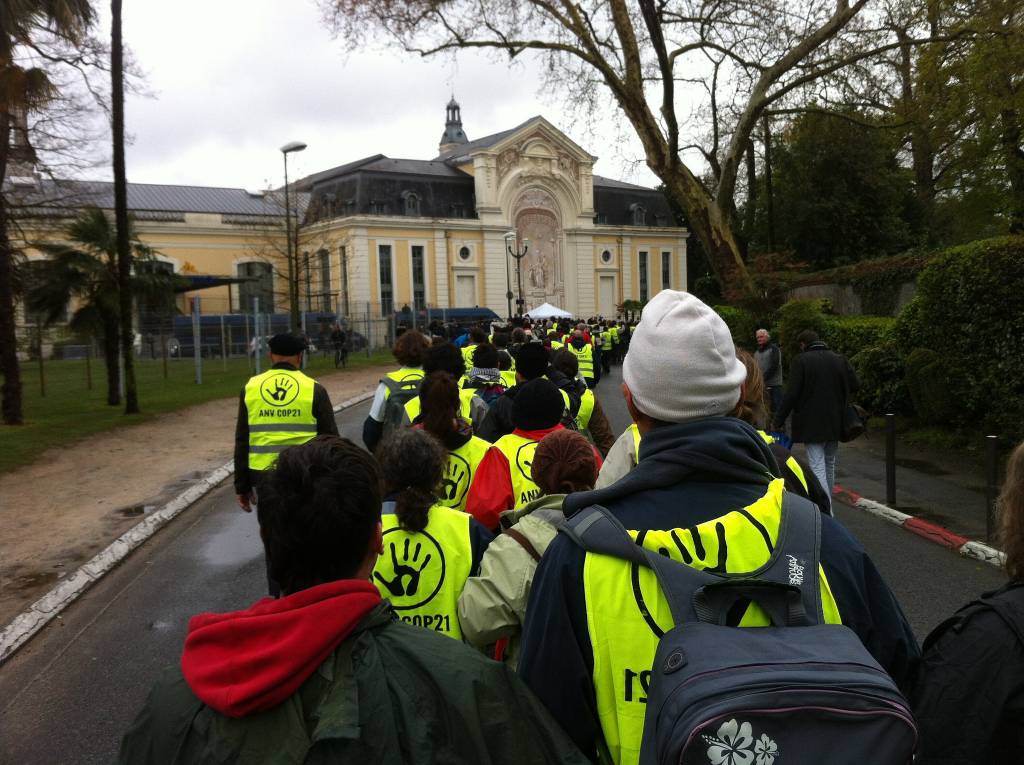
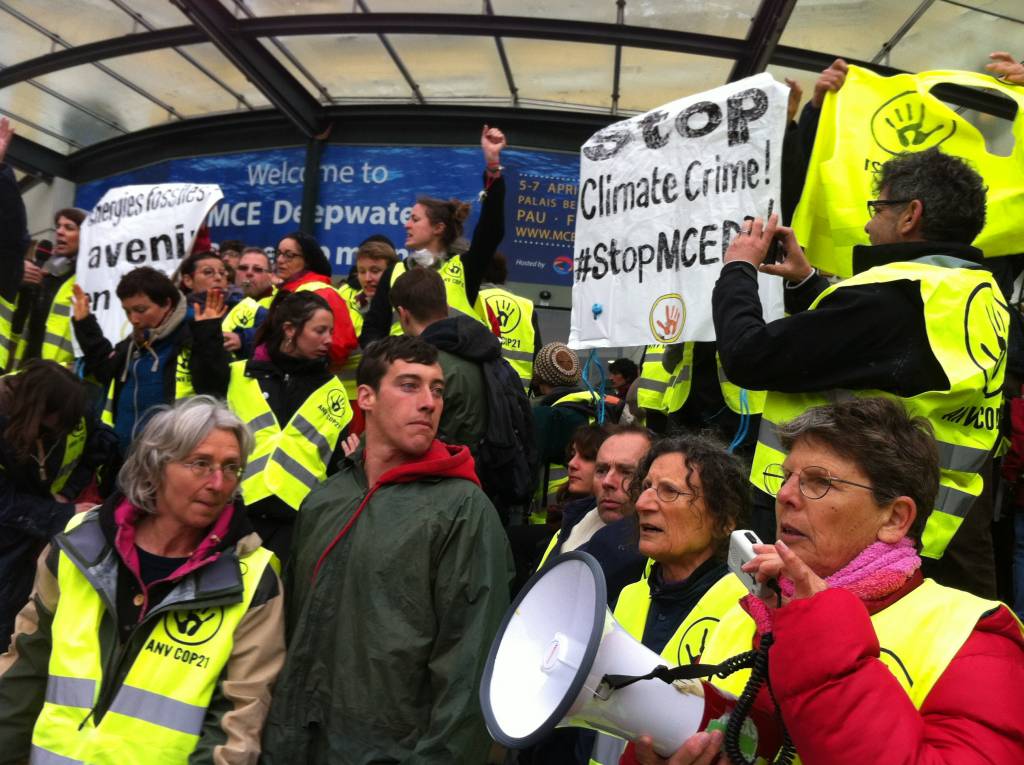
Now we’re running as fast as we can to the Palais Beaumont, to try and get inside the building. Policemen, military police, as well as private security officers all try and block us and decide to close its doors. This is a first victory for us: with the doors closed, no one can go inside – neither activists NOR delegates. At least 50 delegates are locked outside the main gate to the Palais Baumont, whereas their colleagues are asked to use other gates, losing a lot of time to find their way through the surrounding park.
Even better: three activists have managed to get in, and have arm-locked themselves to the stage where the mayor of Pau is due to deliver the opening speech. Instead, big oil executive employees will have to listen to our demand: implement the commitment made in Paris during COP21 – i.e. leave fossil fuels in the ground, in order to maintain global warming “well below” 2 ° C.
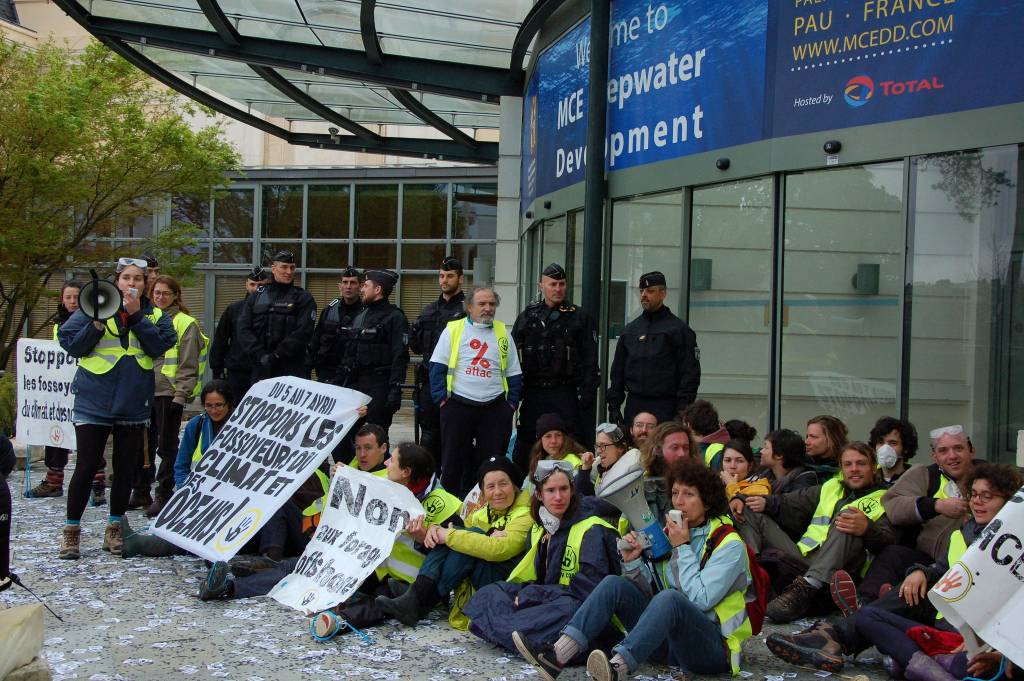
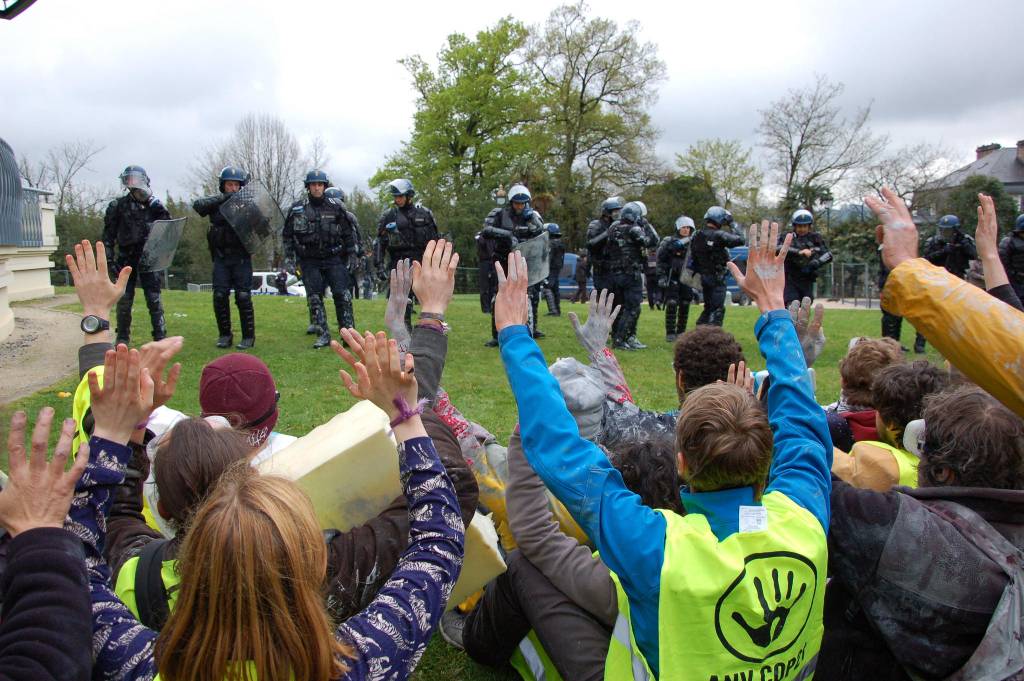
Soon enough, a second “wave” of a hundred activists joins us from the other side of the park. Since we outnumber police forces, we try and breach police barriers, to reach other doors to the venue. We breach with determination, of course, but also with a lot of calm, despite batons, teargas and pepper spray.
We eventually occupy the lawns of the Palais Beaumont all day long. Media coverage is huge – for the first time, mainstream media have decided to cover a professional summit on oil exploitation. They have decided to do so because we are pointing out the fact that this is a harmful business.
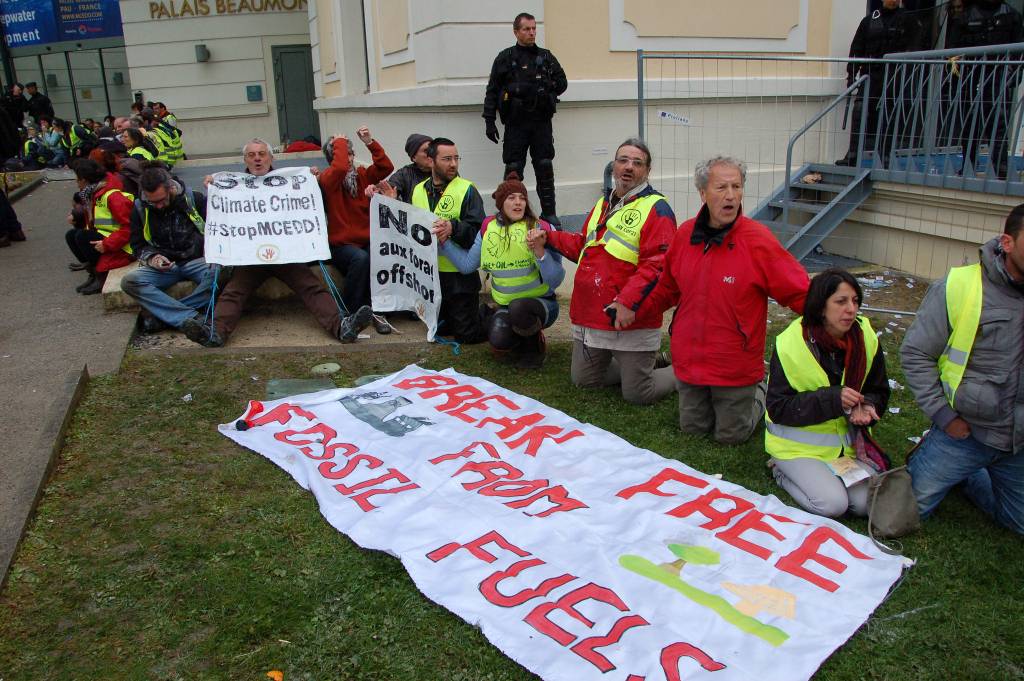
This is what we used to call the “Dracula strategy“, that was used during the early years of the global justice movement. Vampires belong to the shadows and to darkness. When exposed to light, they lose their power, and soon become dust.
And the MCE Deepwater Development summit is a political vampire. It is powerful only because it is discussed, planned and organized behind closed doors. Exposing such goings-on publicly is an important move, and is potentially powerful enough to jam their machinery. These kind of projects will only become a reality if people are unaware of what is really being planned and what the consequences will be.
Opening a public conversation on the legitimacy of such a meeting, just a few months after COP21 (which was described as “the most beautiful of all revolutions” by François Hollande) has political impact. It opens a breach, and contributes to calling into question the social license we agree to grant to the fossil fuel industry. It is a way to state clearly that the fossil fuel industry is more harmful to our future than it is essential to our daily lives.
At the end of the afternoon, we decide to move back to our camp and let the summit participants go back to their hotels.
Wednesday, 6 April – “Nuit debout” (standing night) for climate gravediggers
On the evening of the 5th, Pau was supposed to hold its first “Nuit Debout” (Standing Night – name of the french current wing of Occupy Wall Street & Indignados movement). But the rain was too heavy to massively occupy public space.
In the first hours of the 6th of April, the city experiences yet a very specific variation of the Standing Night. At 2am, several activists gather in front of the 5 Stars palaces in which the most important delegates are spending their nights. Using horns, sirens and megaphones we wake them up from their sleep: we won’t let them dream because the future they’re preparing is a nightmare. Two hours later, the same scene is repeated – yet with some innovation: activists have entered the hotel and target more specifically the top floors, the ones with the fanciest suites. At dawn, after a restless night, delegates realize that they can’t leave their hotels through the front door: several activists have lock themselves with chains and handcuffs to the outside gates.
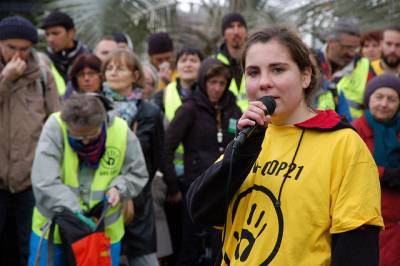
These actions are not petty at all. Quite the opposite: when a system is about to collapse, when it wobbles and shakes on its ethical and moral foundations and roots – trying to “convert” some of the actors who were previously making the system function, becomes a strategic priority in order to trigger change. This requires the need to push those actors to question the very meaning of their activity – in this case of their job. Disturbing their sleep is neither stupid or mean. It is meant to raise awareness among them: when coming back home, many of them will tell what happened in Pau to their relatives or to their close friends. They will explain that activists came to wake them up in the middle of the night, because they wanted to denounce the harm that the industry they do work for causes. Thus, critics enters the intimate, inner, personnal circle of the oil industry executives’ lives. And we all know that the critics-justification pair is much more difficult to deploy at the advantage of justification when it comes to ethical and personnal considerations. It is about planting seeds.
Our actions do not stop once the sun rises. We keep on disrupting access to the Palais Baumont, forming a giant human chain in front of the main gates. When the evening gala begins, we reply with our own unpermitted concert, just a few meters away from the windows of the Casino their fancy party is happening. Because we don’t only make noise to disturb them: we also know how to make make noise to have fun, to dance and to celebrate.
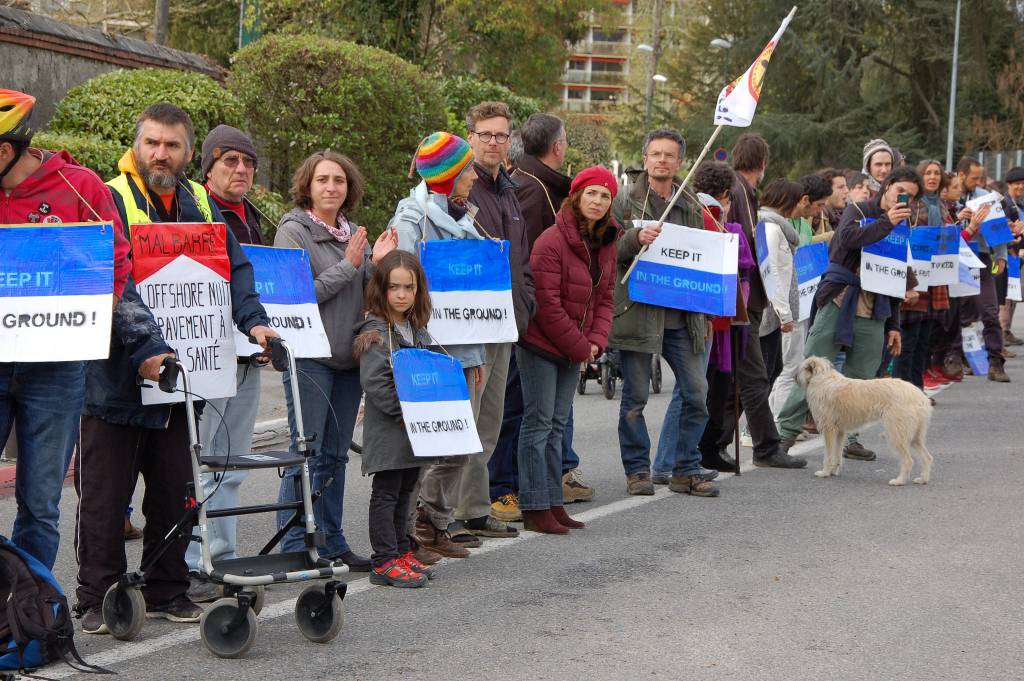
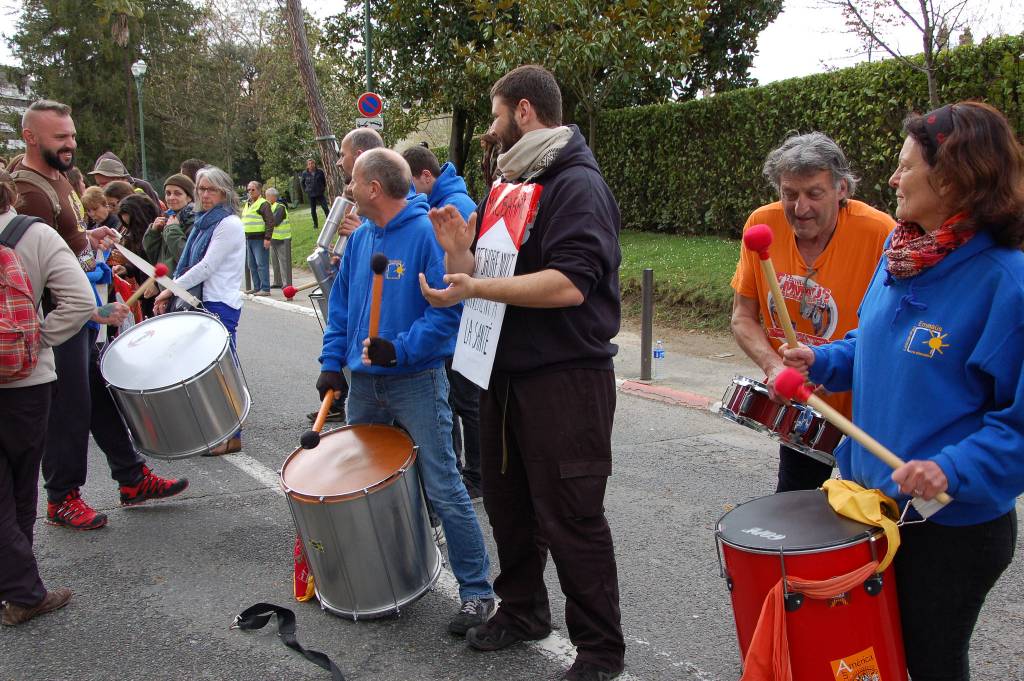
Thursday, 7th of April – The Velvet Underground and Ende Gelaende
We all feel tired. The last 36 hours have been very intense. I decide to step back a little, and arrive at the Palais Baumont later than I planned. And I am soon thrilled: all the accesses to the building are blocked. 150 activists are chained to the main gates, to the wheels of the truck of one of the summit organizers, or to police barriers. Inflatable cubes that were part of the choreography of the Red Lines action in Paris, on the 12th of December, are blocking another access. Teargas and pepper spray saturate the atmosphere – and are a source of discomfort for everyone: policemen, activists, but also congressmen and congresswomen… Somehow, the police is helping us blocking the summit!
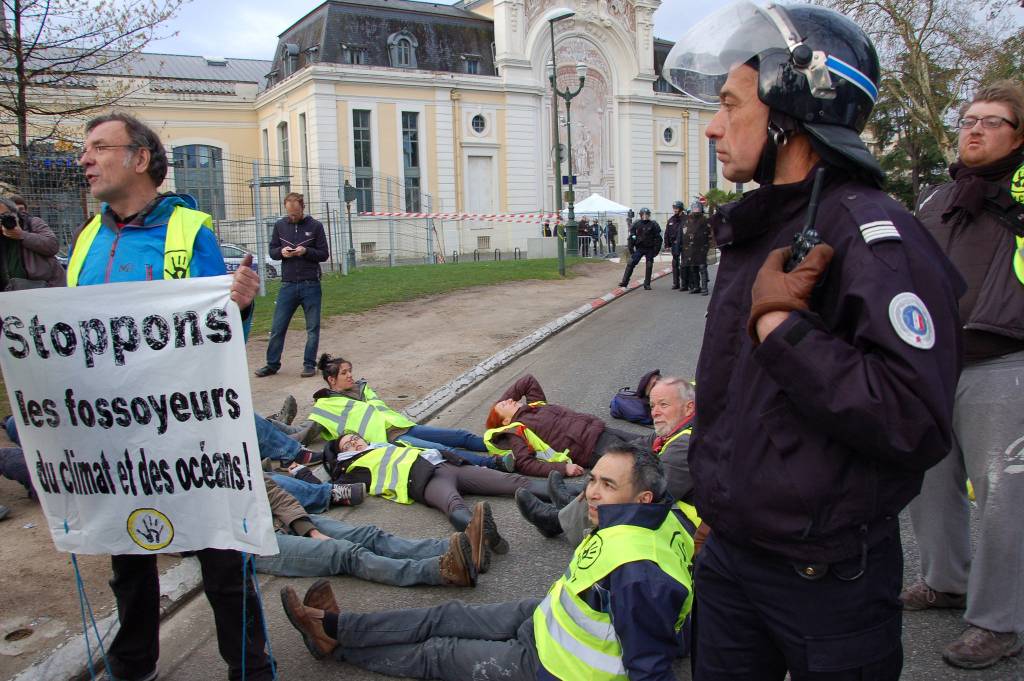
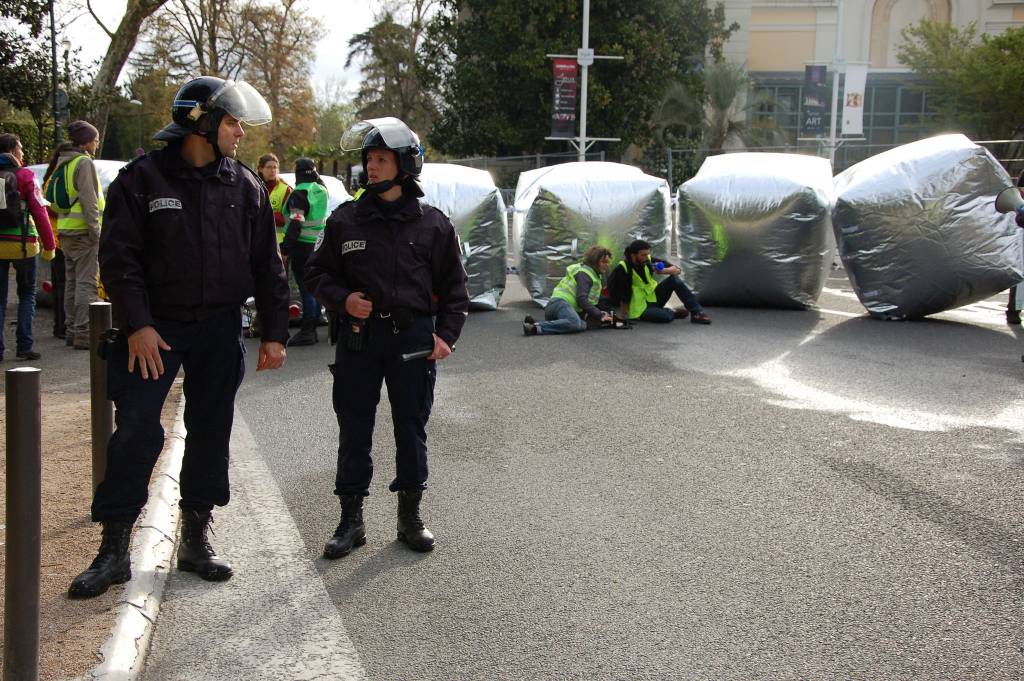
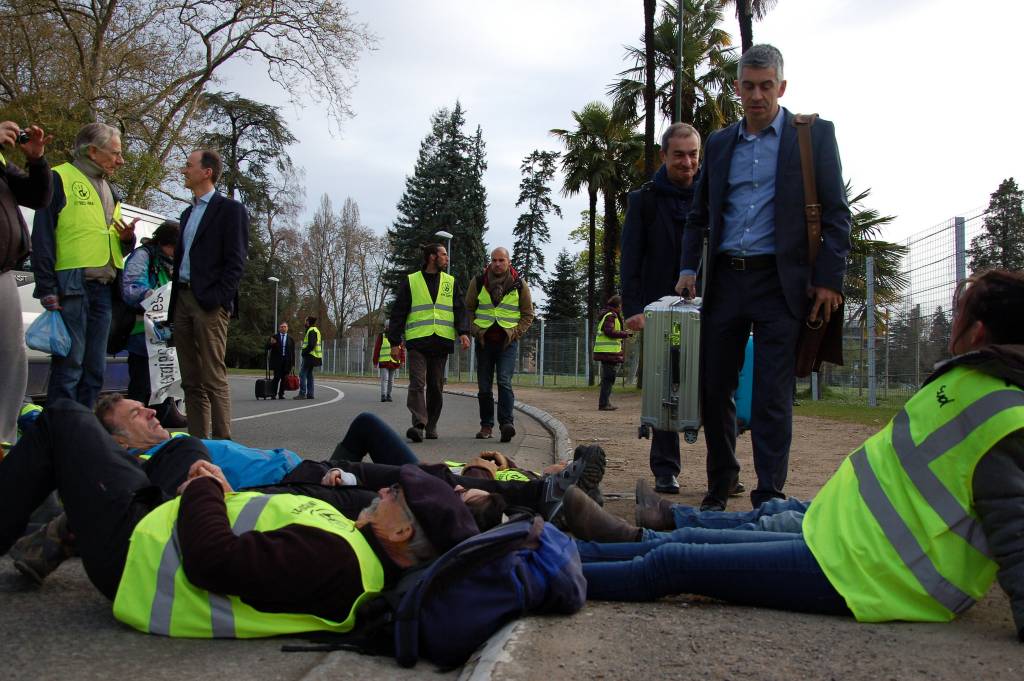
Elsewhere, we decide to organize a die-in. Congress participants can walk through, but they literally have to walk over our bodies. We try to talk to every single one of them – opening path to a few very interesting conversations.
By noon, we turn our small die-in into a giant one. 500 people lie down the road, to stage the fact that climate change kills and show that perpetrators are the ones on the other side of the police fences – protected by them.
Before we stand up again, in order to accompany the delegates back (once the summit is over) we commit to keep on mobilizing to stop climate crimes. Indeed, the Pau mobilization is only a beginning. As explained by Frédéric Lordon, on Paris’ Republic Square on the first evening of the Nuit Debout, “it may well be that we are accomplishing something.”
That something is not in vain: it is about honoring our commitments and our promises. The heads of states and governments are indeed not the only ones to have made strong commitments in Paris during the COP21. We have also committed to mobilize, wherever it would be necessary to block the destruction of the climate. Because we consider that fighting against climate change is something too important to be left to States alone.
Unlike those corporate actors in Pau, we have honored our promise. And we will continue to do so on the 21st of April in Paris, to protest against the “International Oil Summit” to be held Porte Maillot. And, of course, we will mobilize in May, to participate in the “Break Free from Fossil Fuels” actions.
Pau is indeed not an isolated moment. It is not a mobilization without a past or a future. The three days that just ended are part of the same dynamics than climate action camps and blockadias (actions against fossil fuel infrastructures). In Pau, we breached through police lines using tactics most of us discovered last summer, during “Ende Gelaende” (occupation and blockade of a coal mine in Germany). The loop is about to be closed, since the second edition of Ende Gelaende will take place from 13 to 16 May, in eastern Germany, as part of the Break Free campaign.
Ende Gelande was a dawn for many activists. The radicality, the determination, the power, the joy and the tenderness we’ve witnessed in Pau leave little room for doubt: those three days are setting the stage for the coming climate movement.
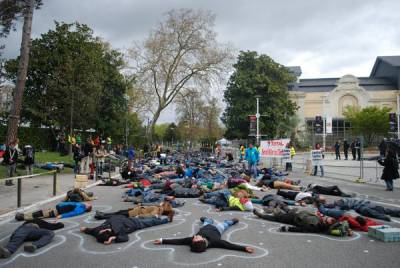 This is “Velvet Underground” syndrome. The bands’ first LP influence on music was inversely proportional to its success. The VU sold only a thousand copies. Back then, no one was expecting this LP to be a milestone in the history of music. But, as the legend now says, it had such a deep impact on every single person who bought the disc that they all created a band. And the LP impacted (and keeps on impacting) people who haven’t listen to it even once in their life.
This is “Velvet Underground” syndrome. The bands’ first LP influence on music was inversely proportional to its success. The VU sold only a thousand copies. Back then, no one was expecting this LP to be a milestone in the history of music. But, as the legend now says, it had such a deep impact on every single person who bought the disc that they all created a band. And the LP impacted (and keeps on impacting) people who haven’t listen to it even once in their life.
Ende Gelaende and Pau are undeniable success. Mobilizing more than 500 people in a few weeks, as we have just done, is indeed a real success. But they’re most importantly successes because of what the promises they carry: all of those who’ve been in Pau are now back home, ready and determinate not to start a band, but to join an affinity group and keep on mobilizing. And Ende Gelaende, as well as Pau, will impact activists imaginations much beyond the circle of those who’ve been there.
Because we care very seriously about climate change, because we have pledged to make sure that the red lines to a just and sustainable future will never crossed — there’s one thing we know for sure: we do honor our promises.